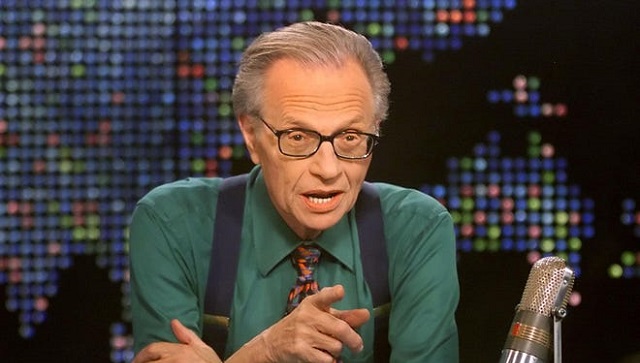Larry King interviewed over 50,000 people over 50-odd years in the entertainment business, including every American president from Nixon to Obama. His 1994 interview with actor Marlon Brando, however, is remembered as one of the most iconic pop cultural moments the late broadcaster was a part of. Famously reluctant to talk to reporters, Brando was interviewed in his own home by King, who went out of his way to make the actor feel comfortable. Non-sequiturs were patiently heard out, rambling non-answers acknowledged as rare pearls of wisdom. At the end of the interview, Brando and King broke into song (the 1930s hit ‘Got a Date with an Angel’ by Al Bowlly) and the actor gave King a quick peck on the lips, saying, “goodbye, darling”. It was a vintage King performance, an exercise in on-air mollycoddling that became something far more whimsical by the end. It was also the perfect illustration of King’s key strengths — the ability to channelise the Everyman, the willingness to make every guest as comfortable as he possibly can. In fact, most criticisms that came King’s way through his career were along these lines — he asked too many softball questions, he didn’t seem to be prepared for interviews at all (he famously asked Jerry Seinfeld why Seinfeld was cancelled, despite the fact that the comedian had turned down an offer to keep the show going for another season). In response, King would say that his lack of preparation was deliberate, that he wanted to learn alongside his audience and not alienate them with an array of unfamiliar facts all at once. [caption id=“attachment_9233351” align=“alignnone” width=“640”] File image of Larry King. AP[/caption] It could be argued that with King’s retirement from his eponymous talk show in 2010, the ‘softball’ format was well and truly on the wane. King’s replacement, for example, was Piers Morgan, the British journalist infamous for making discomfiting, politically incorrect jokes before his guests. Morgan’s various online and offline feuds (the 2013 one with Brett Lee culminated in a cricketing face-off with the retired Aussie fast bowler; Lee broke one of Morgan’s ribs) made him a kind of anti-King figure. It was a sign that even eminently saleable populism was undergoing a tonal shift. One reason why networks were moving out of the King model into the more combative territory is, of course, social media. A more aggressive interviewing approach is in line with the ethos of Twitter, for example. But above and beyond that, it’s about accountability. People don’t want to give celebrities a free pass for their transgressions. They want to see them being asked difficult questions from the word go — there’s often more than a hint of schadenfreude here. But this impulse can also come from an un-ironically righteous place. Jimmy Fallon, for example, is an anchor who is not known for asking the tough questions — quite the contrary. His clip featuring Donald Trump, where he is joking and asking inane questions, was often circulated in anger during the former president’s tenure. Look what you normalised was the prevailing sentiment. Ellen DeGeneres, for example, is another famous exponent of the celebrity interview. And her approach, too, is from the Larry King School of Hollywood Schmoozing. It’s true that DeGeneres’ current decline has to do with her
personal brand taking a hit (following revelations of bad behaviour and a toxic work atmosphere at the sets of The Ellen DeGeneres Show). But it’s also true that people are getting sick of DeGeneres and co. normalising the terrible behaviours of their famous friends — she tried her best to defend Kevin Hart after his homophobic jokes. And then there was the time she watched the ballgame with her “friend” George W Bush. [caption id=“attachment_9233361” align=“alignnone” width=“640”]
File image of former US president George W Bush and CNN’s Larry King. AP[/caption] Basically, people wised up to the fact that the ‘celebrity interviewer’ would always be closer to the celebrity than to the people they addressed on the TV every week. King himself had declared Ryan Seacrest as the one most likely to carry his mantle forward (this was before CNN gave his show to Piers Morgan). You can see why: Seacrest’s sunny disposition and similar risk-averseness made him the natural successor. And what did Hollywood do with this development? They parodied him mercilessly. In one of _BoJack Horseman’_s most brutal takedowns, a recurring character is referred to simply as “A Ryan Seacrest Type”. Mr ARST is a loud, obnoxiously cheerful TV host who interviews actors and is an expert at using hundreds of words to say nothing at all. He is white noise made human, the television-as-fireplace. With King’s death, the entertainment business has lost one of its last remaining links to several bygone eras. He lived through the radio and network eras, the cable boom and saw the birth of the social media epoch. With the polarisation of public discourse being what it is, it’s unlikely that we’ll ever see an Everyman dominating the business like Larry King did. Regardless of what you feel about King’s softball approach, that is still a sizeable loss.
Larry King, who lived through the radio and network eras, the cable boom and saw the birth of the social media epoch, was one of the last remaining links to several bygone eras.
Advertisement
End of Article


)
)
)
)
)
)
)
)
)



